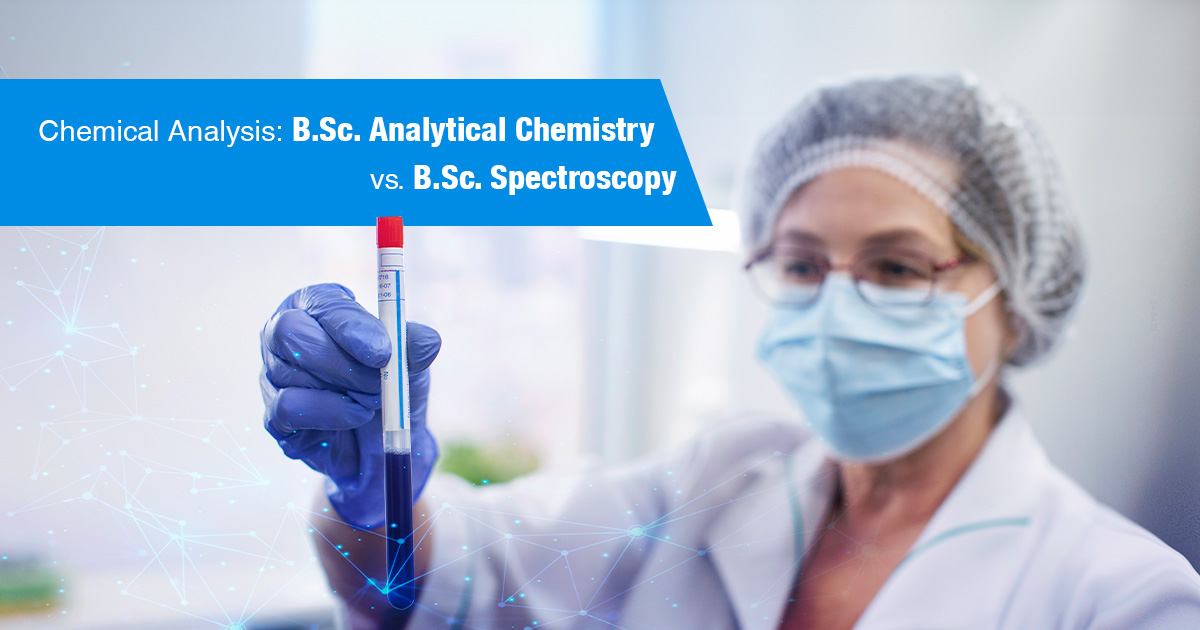Blog Detail


Chemical Analysis: B.Sc. Analytical Chemistry vs. B.Sc. Spectroscopy
28-11-2024

Analytical Chemistry and Spectroscopy are two captivating disciplines in the scientific realm of science. Both the subjects are of real-world importance and the principles postulated from the respective fields have been widely used across multiple industries across the globe. The subject of analytical chemistry can be explained as a meticulous study of the properties of compounds inclusive of features like separation, identification and quantification. Well, spectroscopy can be perceived as a powerful technique in the field of scientific analysis concerned with the interactions between various matters and electromagnetic compounds. The significance of these two scientific disciplines goes hand in hand with their crucial contribution to the scientific progress of the world. In this article, we shall look at the aspects that need to be considered while enrolling for B.Sc Analytical Chemistry and B.Sc Spectroscopy.
B.Sc Analytical Chemistry vs. B.Sc Spectroscopy: Course Duration and Eligibility
The bachelor of science in analytical chemistry and spectroscopy has been structured for 3 years. In these three years, students are introduced to various theoretical papers, along with practical and internship exposure.
The eligibility criteria for pursuing a B.SC Analytical Chemistry and B.Sc Spectroscopy are having completed 12th or equivalent studies with science as the major subject. Additionally, it is also mandatory to have achieved an overall aggregate accepted by the university.
B.Sc Analytical Chemistry vs. B.Sc Spectroscopy: Course Curriculum
Subjects included in B.Sc Analytical Chemistry are:
Organic chemistry, Biochemistry, Inorganic chemistry, Physical chemistry, Nuclear chemistry, Mathematics, Geochemistry, Chemical Engineering, and Forensic chemistry.
Subjects included in B.Sc Spectroscopy are:
Physics, Chemistry, Astronomy, Study of the interaction of electromagnetic waves and matter, Absorption and emission of light and other radiation by matter
B.Sc Analytical Chemistry vs. B.Sc Spectroscopy: Career Opportunities
Principles of analytical chemistry and spectroscopy are widely used across multiple industries and ample amount of career opportunities are available too. Below is a list of career options available for graduates of respective fields.
Career Options for Students Opting for Analytical Chemistry:
● Chemist: Closely works with the research team by analysing organic and inorganic compounds to ensure the quality and safety of the manufactured product.
● Forensic Specialist: Works majorly at crime scenes by collecting and analysing evidence samples.
● Environmental Agencies: Works in different environmental agencies by studying the suspected product and analysing the different features.
● Pharmaceutical Researcher: Works as a professional who carries out experiments to find new drugs and ensure the quality check of the new drugs.
● Agrochemicals: Engaged in formulating compounds that increase crop productivity.
● Academician: Works in schools and universities as teaching faculties, providing necessary guidance to students for research and other investigatory projects.
Career Options for Students Opting for Spectroscopy:
● Research Scientist: Involved in strategising and executing experiments at a wider range to infer solutions for the largely concerning causes.
● Chemical Analyst: Engaged in analysing the reactive power of various compounds and their byproducts.
● Biochemist: A biochemist is involved in studying the physical and chemical principles of living organisms and research revolving around them.
● Chemical engineers: They are professionals who are engaged in designing equipment after closely studying the wave matter, properties and reactive responses of different materials.
● Lab Assistants: They are professionals who work by conducting experiments, deriving results and documenting the process.
In Short
The exploration and research on analytical chemistry and spectroscopy as two disciplines of science reveal the relevance of the subjects in the current world. Further, these science specialisations also open a wide door of possibilities in studying the physical properties of different matters and the potential changes they can bring into the world. Undoubtedly, a bachelor's and a master's degree in analytical chemistry and spectroscopy offer a wide range of rewarding career opportunities. A thoughtful selection of courses after wide research and in alignment with the subject’s interest can bring career satisfaction and success to graduates.